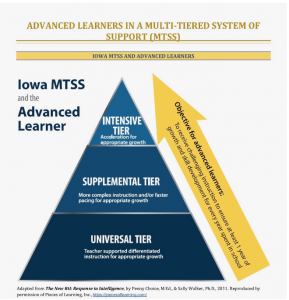Where do gifted learners fit in the MTSS structure?
 Iowa’s Department of Education has published a document- Advanced Learner MTSS Guide. This document is invaluable as we consider the needs of all learners. Included in this document is the familiar MTSS triangle and the three tiers:
Iowa’s Department of Education has published a document- Advanced Learner MTSS Guide. This document is invaluable as we consider the needs of all learners. Included in this document is the familiar MTSS triangle and the three tiers:
- Universal Tier -the most important strategy is differentiated instruction, which usually occurs in flexible small groups within the regular classroom or regular instructional time.
- Supplemental Tier -instruction is “systematic, explicit, and aligned with ongoing universal tier instruction. It parallels what’s going on in the general classroom with adjustments to depth complexity, abstraction and pace. Instruction is based on individual needs.” (Advanced Learner MTSS Guide- p. 14)
- Intensive Tier- students in this tier are highly gifted and will need intense acceleration. Options for this type of interventions range from curriculum compacting to whole grade skipping or early entrance to college.
As we consider each of these tiers, it is important to keep the focus on the needs of the student. Some things to consider:
Don’t ask an advanced learner or gifted student to tutor or help other students in the class when they finish early. Gifted students benefit from interactions from peers with similar performance levels. Asking students to help others may lead to boredom, frustration and lack of motivation.
Don’t assume gifted students don’t need instruction.Gifted students still need help and support from the teacher, gifted students may pick up concepts more quickly than others and may not need the amount of review the rest of the students need. The teacher is crucial in ensuring students continue to grow and support them in fully developing their abilities.
Don’t keep a student in a grade or course due to concerns in social and emotional development. Research has shown the higher the IQ, the wider the gap between a student’s intellectual ability, physical ability and emotional maturity. “…many highly gifted children underachieve in the regular classroom, and that, by the end of elementary school, many have almost completely lost the motivation to excel (Pringle, 1970; Painter 1976; Whitmore, 1980; Gross and Feldhusen, 1990).” In addition studies have show that many students are happier with older students who are more similar as “intellectual peers”. (Colangelo, N., Assouline, S. G., & Gross, M.U.M. (2004). A nation deceived: How schools hold back America’s brightest students. Iowa City: University of Iowa)
Don’t refuse a student entry into a TAG program due to their behavior or poor grades. Utilize multiple data points when identifying students. Students who are gifted may become bored or frustrated when their needs are not being met. Other students may “mask” their abilities to try and fit in with their same-age peers, or there may be a disability that is masking their giftedness (twice-exceptional students).
The Advanced Learner MTSS Guide provides a number of strategies and research for each of the tiers. This document can help identify appropriate supports and strategies for students.
(This is not an inclusive list–see the Advanced Learner MTSS Guide for the complete list.)
| Universal Tier | Supplemental Tier | Intensive Tier |
|---|---|---|
| Flexible Skills Grouping
Accelerated Pace Flexible Tasks Open-endedness, creative thinking |
Cluster Grouping
Curriculum Compacting Cross-graded Classes Complexity |
Single Subject Acceleration
Whole-grade Skipping Curriculum Compacting Grade Telescoping |
On November 27th- Roseanne Malek from the Iowa Department of Education is offering a workshop specifically around the Advanced Learner MTSS Guide. If you haven’t attended this workshop in the past, it is a great opportunity for administrators and TAG teachers to have a conversation on how the needs of our advanced and gifted learners are being met as well as develop action plans to ensure their needs are being met. Register via Professional Learning Course #168395.
If you have any questions or need support in the area of TAG, don’t hesitate to contact one of your Central Rivers AEA TAG consultants.
